Abstract
The objective of this paper is to investigate some of the forms of conduct of macroeconomic policies related to a substantive concept of democracy, characterized by popular participation - direct or through representatives - in decisions that unevenly affect the material well-being of the entire Brazilian population. Special attention is given to decisions about the country's public indebtedness in the years following the launching of the RealPlan. Empirical evidences show a limited democracy, revealed by the material inequality, which in turn reproduces political inequality and restricts real freedom. This is combined with the selective bureaucratic insulation of economic policy decisions, and the parliament's failure to deal with the macroeconomic agenda. The latter is thus left to the control of the executive branch's economic apparatus, which on one hand submits itself to substantial political influence from finance and, on the other hand, restricts popular participation in decisions on both fiscal and monetary policies.
Keywords:
Brazil; Economic democracy; Macroeconomic policy; Neoliberalism; Public debt

 Thumbnail
Thumbnail
 Thumbnail
Thumbnail
 Thumbnail
Thumbnail
 Thumbnail
Thumbnail
 Notes: i) percent scale; ii) three-year moving averages; iii) GFCF as a percentage of GDP; iv) Over/Selic interest rate in ex-post real terms. Source: Author's calculations from the Instituto de Pesquisa Econômica Aplicada (Ipea).
Notes: i) percent scale; ii) three-year moving averages; iii) GFCF as a percentage of GDP; iv) Over/Selic interest rate in ex-post real terms. Source: Author's calculations from the Instituto de Pesquisa Econômica Aplicada (Ipea).
 Notes: i) percent scale; ii) in relation to federal tax revenues, except social security contributions; iii) interest in real terms. Sources: Author'scalculations from Ipea, BCB, and Secretaria do Tesouro Nacional
Notes: i) percent scale; ii) in relation to federal tax revenues, except social security contributions; iii) interest in real terms. Sources: Author'scalculations from Ipea, BCB, and Secretaria do Tesouro Nacional
 Notes: i) percentages in relation to GDP; ii) the maturities of most federal securities are defined by the Ministry of Finance (MF); iii) bonds with fixed rates have their effective rates determined at the time of sale, which takes place at a price discounted from the face value. The law that establishes the characteristics of these bonds does not explain who is responsible for defining the sale prices, but as the issues take place either directly or in a public offer, it is presumed that the decision about sale price is the responsibility of the MF. Source: Author's calculations from BCB.
Notes: i) percentages in relation to GDP; ii) the maturities of most federal securities are defined by the Ministry of Finance (MF); iii) bonds with fixed rates have their effective rates determined at the time of sale, which takes place at a price discounted from the face value. The law that establishes the characteristics of these bonds does not explain who is responsible for defining the sale prices, but as the issues take place either directly or in a public offer, it is presumed that the decision about sale price is the responsibility of the MF. Source: Author's calculations from BCB.
 Notes: i) percent scale; ii) annual nominal rates; iii) the line "Expected" is drawn from the median of the forecasts for the target for the Selic rate during the period between the date it is set and the immediately preceding meeting of Copom that set the rate in force until then. Source: Author's calculations from BCB.
Notes: i) percent scale; ii) annual nominal rates; iii) the line "Expected" is drawn from the median of the forecasts for the target for the Selic rate during the period between the date it is set and the immediately preceding meeting of Copom that set the rate in force until then. Source: Author's calculations from BCB.